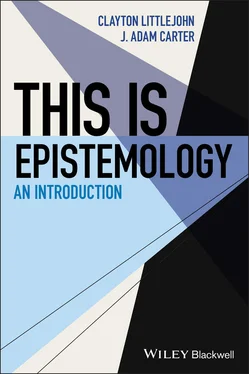2.64If we reject the Premise Principle and try to give an account of perceptual justification or knowledge, we might tell a broadly reliabilist story, one in which some psychological processes or capacities are sources of knowledge because the causal processes that they are part of lead us to form true beliefs in a sufficiently high number of cases. Many philosophers are troubled by these approaches because they seem to leave open the troubling possibility that the thinker can come to know things even when there is nothing that was the thinker's reason for believing these things. This might seem strange in general or it might seem false to the case of normal perceptual knowledge and justification. If someone presses us to explain, say, why we think that there's a pig in the path, we might say that we believe this for very good reason – we see that there is one standing before us. If someone asks us why we think that it is a pig , we might say that it looks pink, that it has a certain shape, that it has a distinctive and striking smell, etc. Even if we're generally skeptical of the Premise Principle , we might think that in the case of perception our experiences do provide us with reasons that help to justify our beliefs. We might think that a way to respond to Davidson would be to challenge his No Content View .
2.65The Content View (i.e. the denial of the No Content View ) has become incredibly popular in the recent literature. 18 On the Content View , experiences are actually like beliefs in that they present things as being various ways – they present objects as having certain properties such as shape, color, location, distance, etc. Moreover, like beliefs, they can be evaluated for their accuracy. The idea is that the experience you are having right now presents things as being a certain way. Things could be that way, in which case your experience is veridical. If things weren't that way, your experience would not be veridical.
2.66If we buy into the Content View , it seems that this removes the main obstacle to treating experiences as potential sources of reasons. It allows us to say that experiences are like beliefs in that they have contents, they stand in logical relations to our beliefs, and they can give us reasons to believe things are one way rather than another. Should we think of experience as having content? Perhaps. Think back to the case of illusion. A stick that feels straight might appear bent if it's submerged under water. It seems that touch presents the stick as having a property, perception presents it as having a conflicting property, and we know that no stick can have both. If vision gets it right, touch gets it wrong, so vision and touch are akin to belief because they can present things accurately or inaccurately. Consider another example. Consider the experience had while looking around a crowded airport for a place to sit. Consider now the experience had while sitting comfortably in a chair at home reading a book and enjoying a cup of tea. If you were hallucinating at home and you had the first experience, that experience would be less accurate than the second. Thus, it would appear that experiences (hallucinatory or otherwise) can be assessed for accuracy, and we can think of their content and of identifying how things would have to be to be accurate. 19
2.67If the Content View is correct, we have our answer to Davidson's argument. Although experiences are distinct from beliefs, they are sufficiently like beliefs in that they have representational content and can support beliefs in much the way that beliefs do in reasoning. Thus, just as it wouldn't be arbitrary to conclude that John is married from the premise that John isn't a bachelor, it wouldn't be arbitrary to judge that, say, the tomato you see is red and bulgy if your experience represents the tomato as being red and being bulgy.
2.68One nice thing about the Content View is that it seems that it gives us the tools we need to address the arguments from illusion and hallucination. Think about two things that some people might believe:
1 Santa Claus is coming to town.
2 Susanna Siegel wrote Murder on the Orient Express.
2.69Our beliefs sometimes misrepresent the world. They might, as with (1), present the world as containing things that do not exist. They might, as with (2), present existing things as having properties that they don't have. We saw that it was difficult for a naïve realist to account for the possibility of illusion and hallucination, but there is no special difficulty in understanding the possibility of having propositional attitudes like belief that misrepresent how things are. Once we are open to the idea that experiences are like belief in that they also have representational content, we have more resources for trying to explain the possibility of misrepresentation in experience. If the Content View is correct, the content of an experience accounts for the fact that things look or appear or seem a certain specific way to an individual who has that experience. We can thus account for the possibility of things appearing to be ways that ordinary things are not.
2.9 Conclusion: Choosing a View
2.70Let's tie the threads together. Recall from earlier that we distinguished between two foundationalist views:
Cartesian foundationalism : something stops the regress of justification by constituting a justifier for our foundationally justified beliefs iff this is something distinct from a belief that provides the thinker with certainty that her foundational belief is true.
Modest foundationalism : something stops the regress of justification by constituting a justifier for our foundationally justified beliefs iff this is something distinct from a belief that provides the thinker with adequate albeit fallible support for her foundational belief.
We want to know whether experience can stop the regress of justification and provide us with non‐inferential justification for our perceptual beliefs. It might be a good idea to split this question into two parts.
2.9.1 On Cartesian Foundationalism
2.71The Cartesian foundationalist thinks that nothing can stop the regress of justification unless it provides certainty. It's important to distinguish between two kinds of certainty, psychological and evidential:
Psychological certainty : A proposition is psychologically certain for a thinker iff they cannot doubt to even the slightest degree whether it is so.
Evidential certainty : A proposition is evidentially certain for a thinker iff the thinker's belief in that proposition could not be mistaken given the thinker's evidence.
These kinds of certainty can come apart. If we have epistemic certainty without psychological certainty, we suffer from a kind of confidence deficit – we should have more of it. (Imagine that someone has just constructed a proof but lacks the confidence to believe that they've solved a tricky mathematical problem.) If we have psychological certainty without evidential certainty, we suffer from a kind of confidence surplus – we should have less of it. (Imagine that someone is a member of a cult. They believe outrageous things on the word of a charismatic liar and nothing can shake their conviction.) The Cartesian foundationalist thinks that we need evidential certainty to stop the epistemic regress. Can experience provide it?
2.72Many philosophers have thought not. They might offer this argument in support of their position:
An Epistemological Argument from Error
P1. The evidence that experience gives us in a case of hallucination doesn't make it evidentially certain that our beliefs about the external world are true.
Читать дальше












